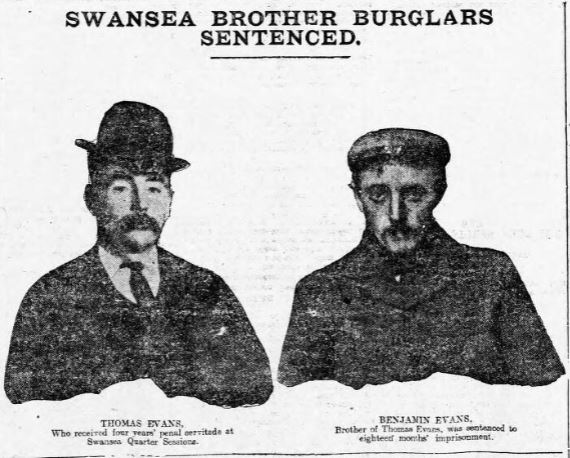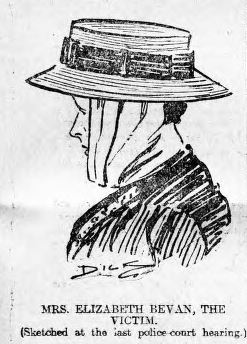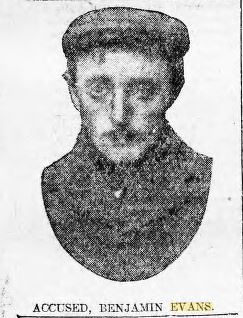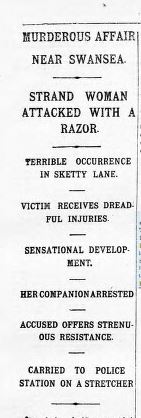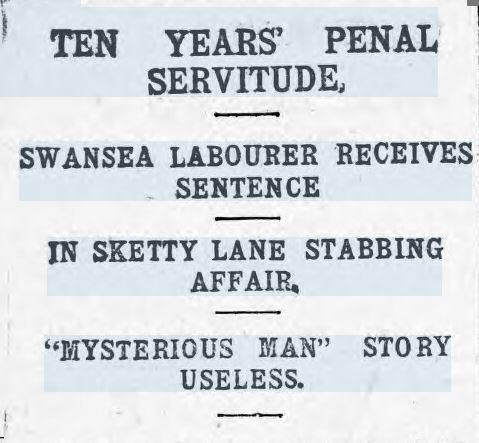Today I think we should talk about Ben Evans. No, not that one ,not the department store, known as the Harrods of Wales. No, the other one. You know. The Burglar, the one who described himself as a milkman and lived on Scyborfach Street. That one. Which, of course, is the reason why this piece is called the Sketty Lane Stabbing
In January 1907, Benny appeared in court, along with his older brother, Thomas, because together they represented a particularly enthusiastic crime wave that had washed backwards and forwards across Swansea. They had broken into houses everywhere. Nowhere was safe, not even Scyborfach Street. They visited Cwm Level Road, Mysydd Terrace, Windmill Street, Carmarthen Road, Terrace Road. They had taken two gallons of whiskey from the Railway Inn and 2 twenty eight watches from David Crystol, the pawnbroker on Neath Road. In fact, Thomas was a keen recycler, for he would pledge stolen items at a pawnbrokers and then break in later and steal them back. When they started to read out the list of addresses they had raided, Ben Evans told the court, ‘You need not read anymore. I plead guilty to the lot.’
He had been arrested in Maesteg and charged with 29 burglaries, along with his brother Thomas, who was eleven years older at 33, and the received opinion was that Ben (22) had been lured into crime by his incorrigible brother. As a result, the court decided to show him some leniency, believing that he could be redeemed. And so, whilst Thomas was sent to prison for four years, Benny was sentenced to eighteen months.
He therefore completed his sentence in the summer of 1908, when our story really begins. On his release from prison, Benny became a labourer but more importantly began (or reignited – depending on which version you believe) a relationship with Elizabeth Bevan, 35, from Foxhole, who was married with children but estranged from her husband. They moved in together in Beaufort Buildings on the Strand.
By late May 1909 the relationship appeared to have run its course. Evans had gone to live with his mother and Elizabeth expressed her intention of seeking a reconciliation with her husband. Evans though was not happy about her intentions, and asked to meet her, in an attempt to resolve their difficulties.
On Thursday 3 June, they met twice during the day and they were not making much progress at all, and all the drink they had didn’t offer any solutions either. In the evening, they went out again to Sketty, drinking and eating sweets. But soon it was time to go home, time to say goodbye, and so they walked down Sketty Lane to catch the Mumbles train back to Swansea. They paused in a gateway in the darkness of this lonely unlit lane and Elizabeth offered her final complaint, her red line, I suppose we would say.
Benny had lived with her whilst he had been out of work since last November, and then, on the very first week he received the wages from his new job, he went home to his mother and paid her for his keep. Elizabeth was clear; this had been the final straw. ‘You are home with your mother now and you must remain there.”
He walked away from her but then came back with his coat unbuttoned. “There’s a man there!” he said pointing, She turned and then felt Evans put his hand on her shoulder, and then something sharp was drawn across her throat. She put her hands up to protect herself but was horribly cut on her hands and face. He had attacked her with a razor.
She managed to get hold of it to restrain him and he said ‘If you break it, I have another one’ but she managed to snap it. He told her he would get away with it by saying they had been attacked by a group of men. She pleaded with him. ‘Don’t murder me, for the sake of my children,’ but Evans told her that if he couldn’t have her, no one else should. When she fell to the ground, with blood flowing freely from her throat, he walked away a short distance, but then returned and knelt down by her side, and listened with his face against hers, kissing her two or three times. She held her breath as much as she could, feigning death, and then heard him say, ‘Poor girl! I am sorry for you. You have been a good girl to me.’ Then he left the scene and walked back up to Sketty.
.Elizabeth was found, for her screams had attracted attention, the police were sent for and she was taken to hospital, where she was not expected to survive. She had received thirteen wounds, the worst of which was a four inch cut across her throat, down to, but not penetrating, her windpipe.
When the police took her statement from her hospital bed , for she was expected to die, Elizabeth initially chose to support what would become Evans’ story, saying they had both been attacked by men in the lane who were out to get Benny, but she couldn’t maintain the story in any convincing way. Later, she said that she couldn’t remember saying anything like that at all .
Evans was arrested, rather untidily as it turned out, later in the evening. He was found on the Strand with a woman. It was in fact his mother, but initially he told her to say nothing and, for some reason, to, ‘Cover your face up; don’t let ’em see your face, whatever you do.’ Interestingly, she did as he said,
When told he had been detained on suspicion of attempting to murder Mrs. Bevan, he replied, ‘Where’s your warrant? I won’t tell you I did it; nor I will not tell you I didn’t.’ which isn’t quite as clever as he probably thought it was.
Evans resisted arrest and the constable called for assistance from two Corporation tap inspectors who were nearby. One of the inspectors, named Crook, (obviously) blew the police whistle, whilst Evans threatened him with a great many exotic punishments for doing so.
Eventually, they had to get the police stretcher, as well as three more constables, who strapped him to it and carried him to the police station. When he was charged, he said, “I’ve nothing to say; it makes no difference what I say.” His hands were covered with blood, which, he said, was a consequence of fighting with a man named Maddocks. There was a scratch on his cheek. All his clothing was splattered with blood. There wasn’t a great deal of doubt in anyone’s mind about what had happened. He claimed they had been assaulted and that he had pursued one of the attackers, leaving Elizabeth behind, but he could not explain why he hadn’t gone back to see how she was, and no one was inclined to believe him.
Awaiting trial, he wrote Elizabeth letters. In one he says
I am writing this because it is helping to satisfy my mind. I know the power of the love you have for me. I am going to leave this case entirely in your hands. I am not going to ask or answer any questions. One question I was longing to ask you was if you would shake hands with me for the sake of the love you bear me and for the sake of the martyrdom love has caused us both during the past eight years. Put aside the barrier between us and write me a few lines, if you are not too bad. I am thinking a lot about you the same as usual, and about your pain. If you write, it will be the last letter between us on this earth. I know you thought me hard-hearted because I did not cry at the hospital, but my grief is too great for tears. If I die. it will be of a broken heart, and not the gallows.
Letters don’t come much more manipulative than that.
Elizabeth did not answer it, nor a further letter when he begged her, ’for the take of the old love she bore,’ to reply, for not to do so ‘would be another stab to a broken heart.’ He then repeated his own version of the incident and asked her to support him , telling her that she would remember that two men attacked them, but that he could not defend her and that when he saw her, he held her, thinking she was dead and that is how he got blood on himself.
He then threatened to ‘bring up your career,” signing the letter ‘Llewellyn,’ allegedly the name of the father of one of her children, something which falls into much the same category as his suggestion in the first letter, that their relationship had started eight years previously when he was still legally a child.
Benjamin Evans was a difficult man without a doubt, determined to exert control over her. He seems to have been very unpredictable throughout their relationship, sometimes cruel, sometimes kind. It is textbook behaviour,
He remained aloof and contemptuous throughout his trial. Even in the dock, he could not resist telling the jury that he and Elizabeth had gone down Sketty Lane for a moment of intimacy and that a man had been watching them. The jury, however, were not deceived and found him guilty.
He was sentenced to ten years penal servitude. Evans ‘took the sentence with comparative indifference.’
I have recently received newly printed copies of my book Swansea Murders which is now available to buy on this website – where it is cheaper than Amazon.
To discover more about the book, find Swansea Murders in the menu or click on this link here, and a page should open in a new window.
Alternatively, you can go straight to the How to Buy Page which you can also find in the menu or you can click here and the How to Buy Page will open in a new window. The book is £11.99 and includes free delivery anywhere in the UK plus, of course, recycled packaging.
If you would like to read a sample chapter from the book, you can find the terrible story of Guistina Macari on the blog. She was three years old when she was horribly murdered in 1941 and we should never forget her.
Click on this link which will take you to the page
